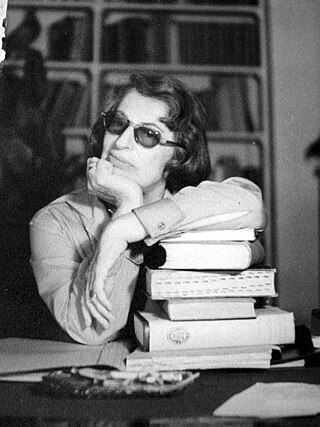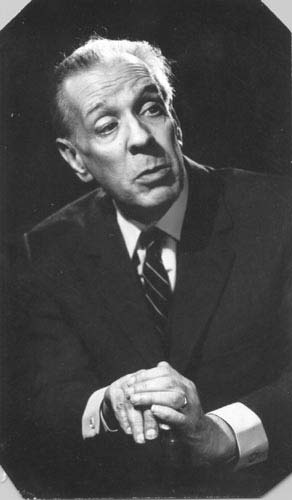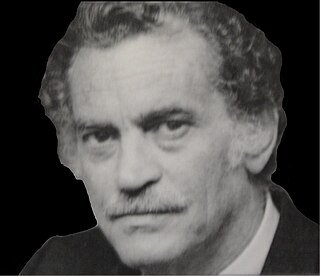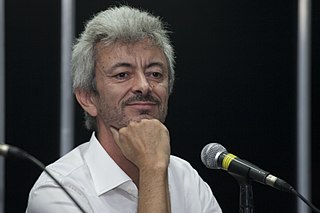
Adolfo Bioy Casares was an Argentine fiction writer, journalist, diarist, and translator. He was a friend and frequent collaborator with his fellow countryman Jorge Luis Borges. He is the author of the Fantastique novel The Invention of Morel.

Julio Florencio Cortázar was an Argentine, nationalized French novelist, short story writer, essayist, and translator. Known as one of the founders of the Latin American Boom, Cortázar influenced an entire generation of Spanish-speaking readers and writers in America and Europe.
"Pierre Menard, Author of the Quixote" is a short story by Argentine writer Jorge Luis Borges.
"On Exactitude in Science" or "On Rigor in Science" is a one-paragraph short story written in 1946 by Jorge Luis Borges, about the map–territory relation, written in the form of a literary forgery.

Silvina Ocampo was an Argentine short story writer, poet, and artist. Ocampo's friend and collaborator Jorge Luis Borges called Ocampo "one of the greatest poets in the Spanish language, whether on this side of the ocean or on the other." Her first book was Viaje olvidado (1937), translated as Forgotten Journey (2019), and her final piece was Las repeticiones, published posthumously in 2006.

Emir Rodríguez Monegal, born in Uruguay, was a scholar, literary critic, and editor of Latin American literature. From 1969 to 1985, Rodríguez Monegal was professor of Latin American contemporary literature at Yale University. He is usually called by his second surname Emir R. Monegal or Monegal.

This is a bibliography of works by Argentine short-story writer, essayist, poet, and translator Jorge Luis Borges (1899–1986).

Fernando Sorrentino is an Argentine writer. His works have been translated into English, Portuguese, Italian, German, French, Finnish, Hungarian, Polish, Bulgarian, Chinese, Vietnamese, Tamil, Kannada, Persian and Kabyle.
Norman Thomas di Giovanni was an American-born editor and translator known for his collaboration with Argentine author Jorge Luis Borges.

Rodolfo Enrique Fogwill, who normally went only by his surname, Fogwill, was an Argentine short story writer, novelist, and businessman. He was a distant relative of the novelist Charles Langbridge Morgan. He was the author of Malvinas Requiem, one of the first narratives to deal with the Falklands War. Fogwill died on August 21, 2010, from a pulmonary dysfunction.

Argentine humour is exemplified by a number of humorous television programmes, film productions, comic strips and other types of media. Everyday humour includes jokes related to recurrent themes, such as xenophobic jokes at the expense of Galicians (Spaniards) called chistes de gallegos, often obscene sex-related jokes, jokes about the English, the Americans, blonde women, dark humour, word and pronunciation games, jokes about Argentines themselves, etc.
Mundo Nuevo was an influential Spanish-language periodical, being a monthly revista de cultura dedicated to new Latin American literature. Sponsored by the Ford Foundation, the magazine was founded by Emir Rodríguez Monegal in Paris, France, in 1966 and distributed worldwide. Monegal edited it until 1968 and resigned after a five-part installation in the New York Times that revealed the Congress for Cultural Freedom, a source of funding for the magazine, was a front for the CIA. In fact, it was started as a successor of another Spanish language magazine of the Congress, namely Cuadernos. Mundo Nuevo stopped in 1971 after 58 issues.

Leonardo Garet is a Uruguayan writer, teacher, and member of the National Academy of Uruguay.

Estela Canto was an Argentine writer, journalist and translator best known for her relationship with Jorge Luis Borges.
Domecq is a Spanish family name. It may refer to:

Carlos Gamerro is an Argentinean novelist, critic, and translator. He was born in Buenos Aires in 1962.
Bustos is a surname of noble origin from Northern Spain, more precisely of La Rioja. The surname has its origins in the 11th century. The surname has expanded to the Americas in the 17th century mostly in Argentina, Mexico and Chile.

Lisa Block de Behar is an Uruguayan professor of Linguistics and researcher in Literary Theory, Comparative Literature and Communication media.
Suzanne Jill Levine is an American writer, poet, literary translator and scholar.

La Martona is an Argentine dairy brand, currently owned by La Serenísima. La Martona was originally the first dairy company of Argentina, established in 1889 by Vicente Lorenzo Casares in Cañuelas Partido. La Martona was a pioneer in the local industry due to its control of not only products manufacturing but distribution and commercialization.













